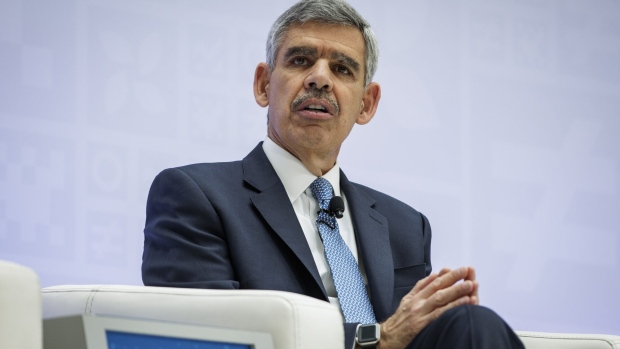Apr 16, 2024
El-Erian Says World ‘Frozen’ by Strong Dollar, High US Rates
, Bloomberg News

(Bloomberg) -- Policymakers around the world are struggling to confront a surging greenback and lofty US interest rates, according to Mohamed El-Erian.
“Authorities are a little bit frozen around the world as to how do you react to a generalized dollar strengthening?” El-Erian, the president of Queens’ College, Cambridge and a Bloomberg Opinion columnist, told Bloomberg Television Tuesday. “How do you react to a generalized increase in interest rates in the US?”
“Unfortunately in the past, when those two things go too far they break something elsewhere,” he added.
El-Erian said that a prime example of inaction has been the yen’s plunge below the 154 per dollar mark this year, a move that has yet to trigger official currency intervention from Japanese policymakers. The dollar has surged this year as traders increasingly dial back expectations of interest rate cuts from the Federal Reserve amid a run of strong US economic data relative to other global peers.
Read more: Dollar Posts Best Run in Year as Fed Seen on Hold for Longer
In El-Erian’s view, the global economy has also proven resilient. But sectors with “imbalanced” balance sheets — like certain regional banks — and countries that have “unsustainable” debt are the most exposed to the impact of tighter financial conditions, he said.
“The growth engines are very unequally distributed around the world right now,” he said. “We’re going to see quite a bit of divergence, not only in policy but also in outcomes.”
Read more: Yen Traders Say ‘160 Is Next’ as Japan Walks Tightrope on FX
El-Erian also said that the likelihood of the Fed hiking interest rates — a move that UBS Group AG strategists said Monday is a ‘real risk’ — is low, but not zero.
“If inflation gets much worse, they could hike,” he said. “But if they do hike, we’re going to have a regional banking crisis. We’re going to have all sorts of damage in the marketplace.”
--With assistance from Lisa Abramowicz, Jonathan Ferro and Annmarie Hordern.
©2024 Bloomberg L.P.






